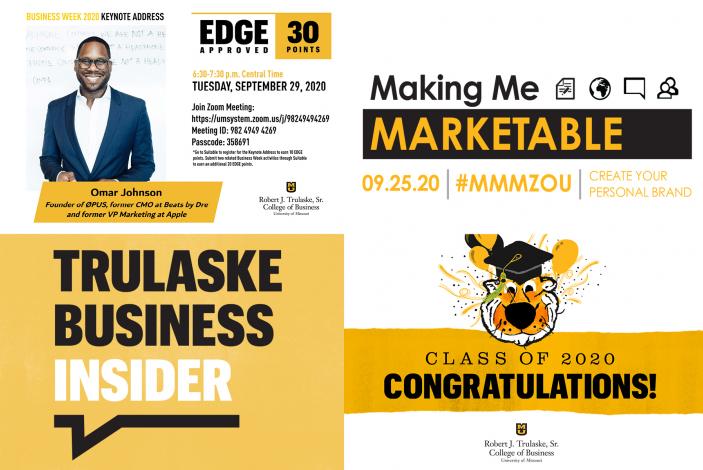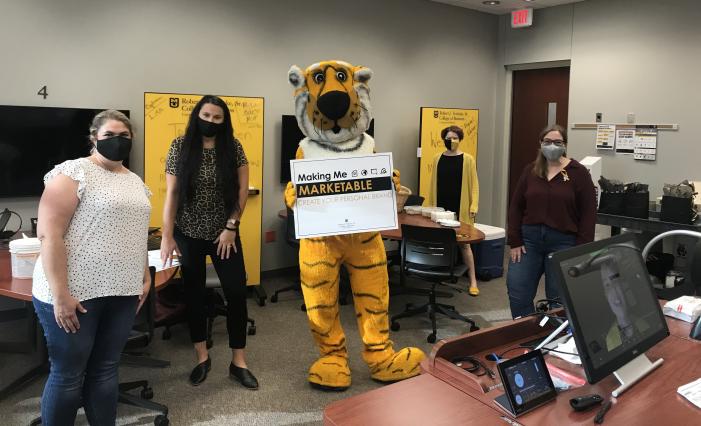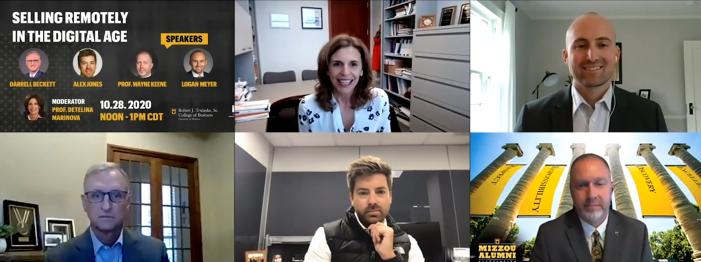
Your Host Has Started the Meeting

by Kelsey Allen
When the University of Missouri went virtual this spring, the faculty and staff at the Trulaske College of Business knew that more than classes would need to move online. Networking events, professional development programs, career fairs, leadership conferences, professional training sessions — they would all need to be adapted from in person to remote.
What Trulaske leaders found is that Zoom not only addressed the needs of students and the community at large, but that virtual events also expanded the college’s reach and increased the impact of its learning opportunities. Here’s a look at six events that were pivoted to virtual spaces to provide students an opportunity to experience campus without leaving their living rooms.
1. Business Week
Business Week was one of the first events the Trulaske College of Business needed to reimagine. Typically held each spring, the weeklong event pivoted to remote webinars on topics including the importance of market research and must-have data analysis skills. But the highlight of Business Week 2020 didn’t come until months later.
In September 2020, Omar Johnson, the founder of ØPUS United, former chief marketing officer at Beats by Dre and a former vice president of marketing at Apple, delivered the keynote address. More than 320 students logged on for his presentation, which not only touched on brand development, advertising and digital marketing but also on the importance of diverse and inclusive teams.
“He spoke to how forming a team of people with diverse backgrounds led to a much richer perspective and made their work all the more effective,” says Allie Teagarden, director of undergraduate advising. “That’s a timely and critical message for our students to hear, especially with some of the discussions that we’ve been having as a college and as a university.”
And students responded to his message. William Curtwright, a senior marketing student, said it was the “greatest presentation I have ever listened to. He talked about how business can change culture, determine social issues and influence social change. He also talked about the difference between informing someone on what their task is versus inspiring them to perform that task — the difference between managing someone and leading someone. He was also talking about thinking about your way, not just what you’re going to do. It all really resonated with me.”
2. Making Me Marketable
For the past 20 years, over 200 students have filed into Memorial Union for a half-day networking conference to learn how to market themselves before entering the workplace and while developing their careers. The 21st annual Making Me Marketable, which took place via Zoom in September, not only featured the hallmarks of conferences past, including a keynote address and skill-building workshops, but it also connected students with 30 industry representatives and recent graduates, some of whom normally couldn’t travel to Columbia for the day. “We added some speakers and business partners who weren’t able to travel previously, so the event actually seemed stronger,” says Assistant Teaching Professor Katie Essing.
For example, Brooke Menchaca, BJ ’14, human resources director at Dollar General headquarters outside of Nashville, Tennessee, joined Raven Birk, BS BA ’18, director of office management and college outreach for Columbia’s Downtown Community Improvement District, to discuss how to adapt and use the skills learned during the COVID-19 crisis in the workplace. Other workshop panelists and speakers included Jazmyn Ferguson, BJ, BS BA ’19, a nonprofit solutions consultant with LinkedIn; James White, BS BA ’83, former CEO of Jamba Juice; and Eric Schupp, BA ’98, MBA ’00, executive director at Jazz Pharmaceuticals, as well as members of the Marketing Advisory Board.
“It was wonderful to make connections and learn about industries (like biotech or pharmaceuticals) that I hadn’t previously considered,” said one of nearly 150 students who participated in the conference. Added another: “I enjoyed getting to hear from people who have had real-life experiences in the workplace. It was helpful to hear their stories about how they became successful. The insights were genuine, and I knew that they were not trying to make life seem like an easy one-lane path but instead show how plans can change and how you can navigate these obstacles.”
3. Trulaske Leadership Conference
For more than two decades, a team of students has planned the Trulaske Leadership Conference. This year was no different — except that everything would be online. So the theme “Transforming the Future” felt fitting.
The transformation started by turning a daylong in-person event into a weeklong virtual conference. This not only allowed more people to participate — over 170 students logged in — but also expanded the number of presentations. Leaders from the Federal Reserve Bank of Kansas City discussed how to embrace change and turn toward adaptability when expected events occur. A campus recruiter for Ernst & Young gave an overview of interviews being held in a virtual space. Execs from Altria discussed how their company is addressing social justice issues as well as how employees can have a positive impact in this space.
“Because it was weeklong and with several training sessions, there were more opportunities for students to be active and involved,” says Lindsay Hing, a career specialist and leadership adviser in Trulaske Business Career Services. “When they were able to be more active and involved, it gave way to more creative content and engagement.”
Adds Nikki Horodenski, key account manager with Altria, the lead sponsor for the event: “There were moments of concern and challenges, but being virtual also brought a new world of possibilities. 2020 has caused many to pivot, be creative and think differently, which is a hard skill to teach. We were able to live and breathe the theme of ‘Transformation’ this year, which I believe led to a highly impactful, relatable topic for the students.”
4. Career Fairs
At a typical business career fair, students wander up and down aisle after aisle of booths at the Mizzou Rec Center with hopes of engaging in fruitful conversations with company representatives — only sometimes it’s hard to hear. There are usually hundreds of other people in the room.
At the virtual accounting and business Career Fairs, both held this September via the Career Fair Plus app, students were able to schedule 10-minute one-on-one virtual meetings with employers for the day of the fair. “The feedback that we got was that the students preferred this format,” says Matt Reiske, director of Business Career Services. “At a large in-person career fair, there are a thousand students in the room plus hundreds of recruiters. There are a lot of distractions. This year, students could meet one-on-one with employers.”
Prior to COVID-19, the college used the Career Fair Plus app so students could see which employers would be in attendance and find out if they were hiring for internships or full-time employment. The company adjusted quickly to the new environment, and students were quick to adapt as well. About 850 students logged into the app to speak with representatives from about 125 companies. “We even had a few students who met with over 20 recruiters,” Reiske says.
The college will host another career fair in February.
5. Professional Training
The Trulaske College of Business has been hosting Certified Global Business Professional Training sessions for nearly a decade. But this is the first year the event attracted attendees from outside of the continental United States.
The training, targeted at individuals who want to pursue a professional credential or certification in international trade, normally attracts 20 to 30 business professionals. The August sessions were moved online, and 23 trade professionals and 11 students participated — the largest group since the first year the school offered the training. Participants logged on from Missouri, Kansas, Kentucky, Nebraska, Iowa, Illinois, Oklahoma, Indiana, South Carolina, Pennsylvania, Florida and Puerto Rico.
“The online format and the elimination of cost and time associated with travel were appealing, attracting folks from broader geography than we may have historically received,” says Jackie Rasmussen, senior program manager with the MU International Trade Center. “Plus, the way the training was structured, people found that it was a more digestible and more conducive learning environment than they would have anticipated.”
Instructor Jim Foley, an expert in international sales and marketing training and author of The Global Entrepreneur, provided an overview of the core elements of international trade, including global business management, global marketing, supply chain management and trade finance.
“The presentation and delivery of the program were interactive, engaging and very informative,” said one participant in a post-training survey. “Jim Foley’s experience and knowledge as instructor, coupled with Jackie’s facilitation, ensured a successful program.”
Added another participant: “A lifetime of knowledge packed into three days of training … yet somehow it never felt long. The course was fantastic!”
6. Trulaske Business Insider Series
It’s a challenge to stay engaged with alumni, friends and industry partners when most are working from home.
“Under usual circumstances at the Trulaske College of Business, our students, faculty and staff connect with community members and business and academic thought leaders with some regularity in our classes, through seminars and events at the college,” Dean Ajay Vinzé explains. “Some of these interactions are planned and others are serendipitous, in the hallways or elsewhere in Cornell Hall. Once the university pivoted to a remote environment, the college had to envision virtual spaces to create interactions that are critical to professional development in business.”
That’s why Vinzé encouraged the development of the Trulaske Business Insider Series, a monthly lunchtime webinar that provides business-related expertise in a wide array of topics. “The series is focused on issues that are relevant for business but also meaningful for our students,” he says. “We wanted timely issues that covered a broad spectrum.”
Launched in June, the inaugural webinar features a panel of experts who have shared insights on topics such as supply chain disruptions and their impact in Missouri, the country and around the globe. Other issues covered include intrapreneurship and its impact on organizational success, and selling remotely in the digital age. Panelists and presenters include Trulaske faculty as well as senior leaders from industry, human resources executives, VPs of sales, entrepreneurs and thought leaders from academia.
“We’re bringing together people who are thinking through these issues — insiders who are feeling these issues right now,” Vinzé says. “As a school of business, of course we want this to have an academic flavor, but we also want to reflect on and learn from those who are experiencing the issues on a daily basis. While we discuss industry-specific issues, we filter the discussion through a lens of scholarship, allowing the sessions to provide value to practitioners and academics alike.”
With timely topics, engaging panelists and the convenience of joining from home or office, the webinars have had strong attendance from students, faculty and staff, the community, and members of industry. For those who aren’t able to participate in real time, each webinar is available for viewing online shortly after the event concludes.
Looking forward, the series will present webinars focused on organizational climate, ethics and the economy.
For a look ahead at virtual internship info sessions, graduate program webinars and open house events, visit the Trulaske College of Business event calendar.

